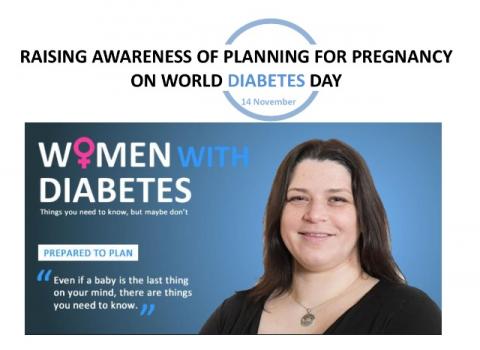Raising awareness of planning for pregnancy on World Diabetes Day

The Health and Social Care Research and Development (HSC R&D) Division at the Public Health Agency (PHA) are funding a project (£90K over 12 months) to improve pregnancy planning for women with diabetes.
This project is part of the HSC R&D Division’s work to improve health and social care by enabling the flow of knowledge from research to practice.
Dr Janice Bailie, Assistant Director, HSC R&D Division, PHA, commented: “Dr Valerie Holmes and her research team from Queens University Belfast have found that there is a need for women with diabetes to improve their planning for pregnancy and make better use of pre-pregnancy care clinics.
“By partnering with the Belfast and South Eastern Health and Social Care Trusts, Dr Holmes has used HSC R&D funding to produce a resource for women with diabetes and those who care for them which will raise awareness of the need to plan for pregnancy and as a result will help improve their maternal and neonatal outcomes.”
Healthcare professionals are encouraged to improve their understanding of the needs of women with diabetes in relation to planning for pregnancy for World Diabetes Day. Babies born to women with diabetes are more likely to be affected by congenital anomalies, including spina bifida, heart and kidney anomalies. However, it is well established that good blood glucose control before and during pregnancy can reduce this risk!
The new website is aimed at women with diabetes and those who care for them. As well as a website helping women to prepare for pregnancy, the resource has an evidence based e-learning component aimed at all healthcare professionals who care for women with diabetes- GPs, pharmacists, practice nurses etc. The resource offers a unique opportunity to educate women and healthcare professionals on the importance of planning for pregnancy and also provides a direct link to local pre-pregnancy care clinics in Northern Ireland for those who are actively seeking to plan for pregnancy.
The project was preceded by a DVD “Women with Diabetes: Things you need to know but maybe don’t!” funded by Diabetes UK in 2010. Women who viewed the DVD resource were more likely to plan for pregnancy and to take folic acid. This online website adaption (www.womenwithdiabetes.net) aims to reach a larger audience of both women with diabetes and the healthcare professionals who care for them, and was supported by a Knowledge Transfer Award from the HSC R&D Division of the Public Health Agency.
Dr Valerie Holmes, Senior Lecturer at the School of Medicine, Dentistry and Biomedical Sciences, Queen’s University Belfast who led the study, said:
“It is important that women with diabetes are aware of the importance of planning their pregnancy. Almost all women with diabetes can have healthy babies if good pre-pregnancy blood glucose control is achieved. Similarly, it is important that healthcare professionals have a better understanding of the risks to women with diabetes during pregnancy and be able to relay that information to their patients.”
Dr Aisling Gough, Women with Diabetes Champion, added: “World Diabetes Day is a global opportunity to raise awareness, and improve education about the importance of planning for pregnancy. By ensuring women with diabetes are aware of the risks of not planning for pregnancy, we can work together with women and healthcare professionals to reduce the number of unplanned pregnancies.”
Dr Michael McBride, Chief Medical Officer, said: “The rate of diabetes is increasing in our population, including among women of childbearing age. It is therefore essential that women with diabetes are aware of how important it is to plan for pregnancy, and that healthcare professionals feel confident to respond to women’s requests for advice. If we can empower ourselves as healthcare professionals to discuss pregnancy planning and care with women who have diabetes, we can empower the women themselves to seek advice and support and to take ownership of their condition.”
Professor David McCance, Consultant Endocrinologist at the Belfast Health and Social Care Trust, added: “Improving health and healthcare experience requires that healthcare professionals have access to education which is evidence based and clinically relevant so that we can continue to provide the best level of care for our patients.”
Every GP and pharmacy in Northern Ireland has received DVDs, posters and flyers about the resource. Find out more on our website- www.womenwithdiabetes.net or follow us on twitter – www.twitter.com/DiabetesWomen
